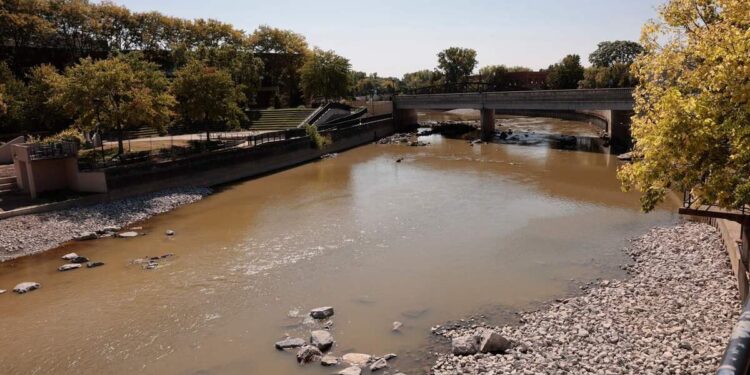When she turned on her faucet one day in 2014, Chanel McGhee was disgusted to see a “brownish” trickle flowing out. Today, it is a strong musty smell that emanates from it.
Residents of the American city of Flint are still suffering the consequences of a historic water crisis, which has fueled strong rejection by the political class.
AFP
For ten years, this mother of two children, living in the state of Michigan, on the border with Canada, has only consumed bottled water.
“I don’t drink from the tap, the smell disgusts me,” sighs this 47-year-old African-American woman in her kitchen filled with strong aromas.
A trap hanging above his sink is blackened by midges.
To wash herself, this currently unemployed woman explains that over the years she has been buying cans, which she pours into saucepans and heats up on her stove.
“I just want us to get to a point where we can live without worrying about water,” sighs the 40-year-old in a gray tank top, saying she feels “exhausted.”
AFP
“They just have to drink it”
The crisis it documents began in 2014, when the state of Michigan decided to switch the water supply to the predominantly black city of Flint for a pittance.
Rather than drawing water from the region’s lakes, one of the world’s largest reserves of fresh water, the authorities decided to draw from a polluted and acidic river, exposing its 100,000 inhabitants for more than a year to water seriously contaminated with lead.
This health scandal with international repercussions is causing learning difficulties in many children.
AFP
A spike in cases of legionellosis was observed, causing the death of around ten people and widespread distrust of public authorities.
They repeat that the vast majority of lead pipes have since been replaced, and that the water is now safe.
“If they say the water is drinkable, that’s their business, they can drink it,” Chanel McGee told AFP.
She says she has no more confidence in the two presidential candidates who are sweeping her highly coveted state for the November election.
Republican Donald Trump, present on site Tuesday? “What can he possibly do for us?” she asks. And Kamala Harris? “I don’t even know who she is,” the forty-year-old replies, shrugging her shoulders.
AFP
“Contaminated city”
“No one seems really concerned about our city and all the problems it’s had,” adds Dennis Robinson, leaning on a table in a small yellow brick canteen.
The sixty-year-old, a lifelong resident of Flint, also “hasn’t drunk city water in ages,” tired of the “lies” from the government.
This former employee of the car manufacturer General Motors, founded in the city and for a long time its main employer, says he has observed “learning problems” among many children in his parish, which he believes are linked to their exposure to lead. An observation corroborated by several scientific studies.
“This is a group of young people who will probably face difficulties throughout their lives,” the man in the black cap says with a sigh.
AFP
A host of initiatives, both public and private, have been launched to provide support to these children and pull Flint, hit hard by the 2008 crisis, out of the doldrums.
More than a third of its population lives below the poverty line.
The centre, with its pretty art deco buildings, has certainly benefited from major renovations.
But entire sections of the city, its houses with boarded-up doors and gutted porches, bear witness to the path that remains to be travelled.
It also remains to get rid of this image of a “contaminated city” that sticks to it.
“There are always people who don’t come from here (…) and who make jokes about the water,” confides Bri Gallinet, a waitress in a posh restaurant.
“Every time we serve a table and put glasses of water on them, they laugh and ask us if it’s clean,” says the 35-year-old. “I tell them I’m not here to hurt them,” she exclaims.
“It’s not really funny, and it makes us sad.”



